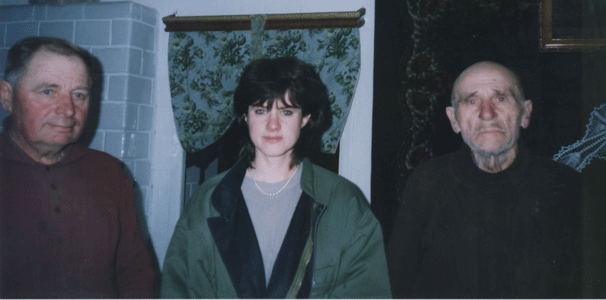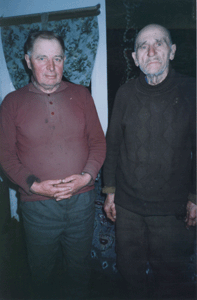|
Return to Amstibava Published in the MARK ROBINSON meets a Tyneside teacher who went is search of her past in Byelorussia, where she heard a horror story of the rounding up of a village’s Jews by the Nazis. Every man. Every woman. Every child. |
|
||||||||||
| The old man was cutting a dead sheep on the living room table when they walked in. He barely looked up as the farmer explained what the young foreign woman with him wanted to know. | |||||||||||
| Did he remember a family called Caller who left long ago? Franz Ivanovich Okulinsky said he did. There were two Caller brothers who emigrated to America in 1935. He remembered the name because one was a cobbler with whom he had done business. He remembered the Jews of Amstibava… The young foreign woman was moved. “I don’t know why but I couldn’t stop crying. I dreaded what I might hear next. Suddenly the Holocaust and my family history seemed too close…” Carrie Supple taught history a world away in Tyneside (England). But she was always aware, when teaching the story of 19th century Britain, that her family lived a world away at the time. There was a gap to be filled. She had come to Amstibava in Byelorussia in search of her past. It seemed Franz Ivanovich Okulinsky could help her find it… The old man looked down as he spoke, as he remembered the day in 1941, when the Nazis drove into the village. For them it was just another day, just another village. For the Jews in Amstibava it was the end of the world. There were 300 Jews in the village that day. The Nazis wanted every one. Every man. Every woman. Every child. And when they were satisfied they’d found them all, they took them all away. The old man didn’t know what had happened to them. Except, he said, that they were killed. They may have been taken to Volkovysk. There was a Jewish ghetto there, set up by the Nazis. Anyone who stepped outside was shot. On September 24, 1941, 2,000 women and children were taken out of the ghetto and murdered anyway. If they got past Volkovysk there was a death camp at Minsk. Carrie had to leave the cottage. There seemed no chance of meeting any survivors from the old Jewish community. The Nazis had done their job ruthlessly and efficiently, just like they had in hundreds of Eastern European towns and villages in 1941. The farmer took her on a tour of the village. He showed her where the rabbi once lived – where the synagogue was burnt to the ground – and he showed her the old Jewish graveyard. “I had to get out of the village after that. The graveyard was so run down and neglected. You could hardly read the letters on the tombstones. And just being in a place where there was once a thriving Jewish community that no longer exists was unbearable.” “When I said goodby to the farmer, he said ‘You should come back and start the Jewish community all over again’. I didn’t know whether to laugh or cry.” Carrie had come to Russia to give a seminar on teaching the history of the Holocaust to children; she had just written a text book on the subject. She had been told by an aunt about the village in Byelorussia and decided to go in search of her past. “All the Russians I’d met in Moscow said my village wouldn’t be there, that I wouldn’t find anything because that was where the Germans invaded from Poland. The name might even have changed.” “I couldn’t picture the place. The village was something the family used to joke about. Something in the past.” Carrie got off the train in Minsk and along with George, another conference delegate from Tblisi who would act as translator, jumped into a hired car driven by a young local called Vlad. Vlad pulled up in a town called Volkovysk, around 300 km west of Minsk. He stopped two old women in the road and asked them if they know of a village called Amstibava. They did. They were only four miles away. And then they were there. Amstibava. When Carrie got out of the car and looked around she knew that this was the place. It looked familiar. Not only that, but it sounded and smelt like her childhood home. “The first thing I noticed was the smell. I could smell burning wood. It reminded me of home because I always loved the smell of bonfires.” “And then I heard a woodpigeon, which was really strange, because that’s always been a sound I associate with home and security.” This was where Grandpa Louis was born. Carrie never really knew him. He died when she was young. Her family left at the turn of the century, shortly after Carrie’s grandfather, Louis, was born, the aunt had told Carrie. His father, Isaac, had already been over to Newcastle five times, importing timber. The sixth time he took his wife, Annie, and five sons with him. And there they stayed, living in Elswick, where they set up Caller and Sons, Cabinet Makers, off Scotswood Road. As his great grand-daughter discovered, leaving Amstibava turned out to be the best decision Isaac Caller ever made… There was just one Jewish survivor from the slaughter in 1941. He is still alive, and lives in Poland. What’s more, two villagers from Amstibava have recently been to see him. He may know something about the Caller family. He may even be family. The history teacher from Tyneside is determined to find out. Carrie Supple’s book, From Prejudice to Genocide; Learning About the Holocaust, was published by Trentham Books. |
|||||||||||

